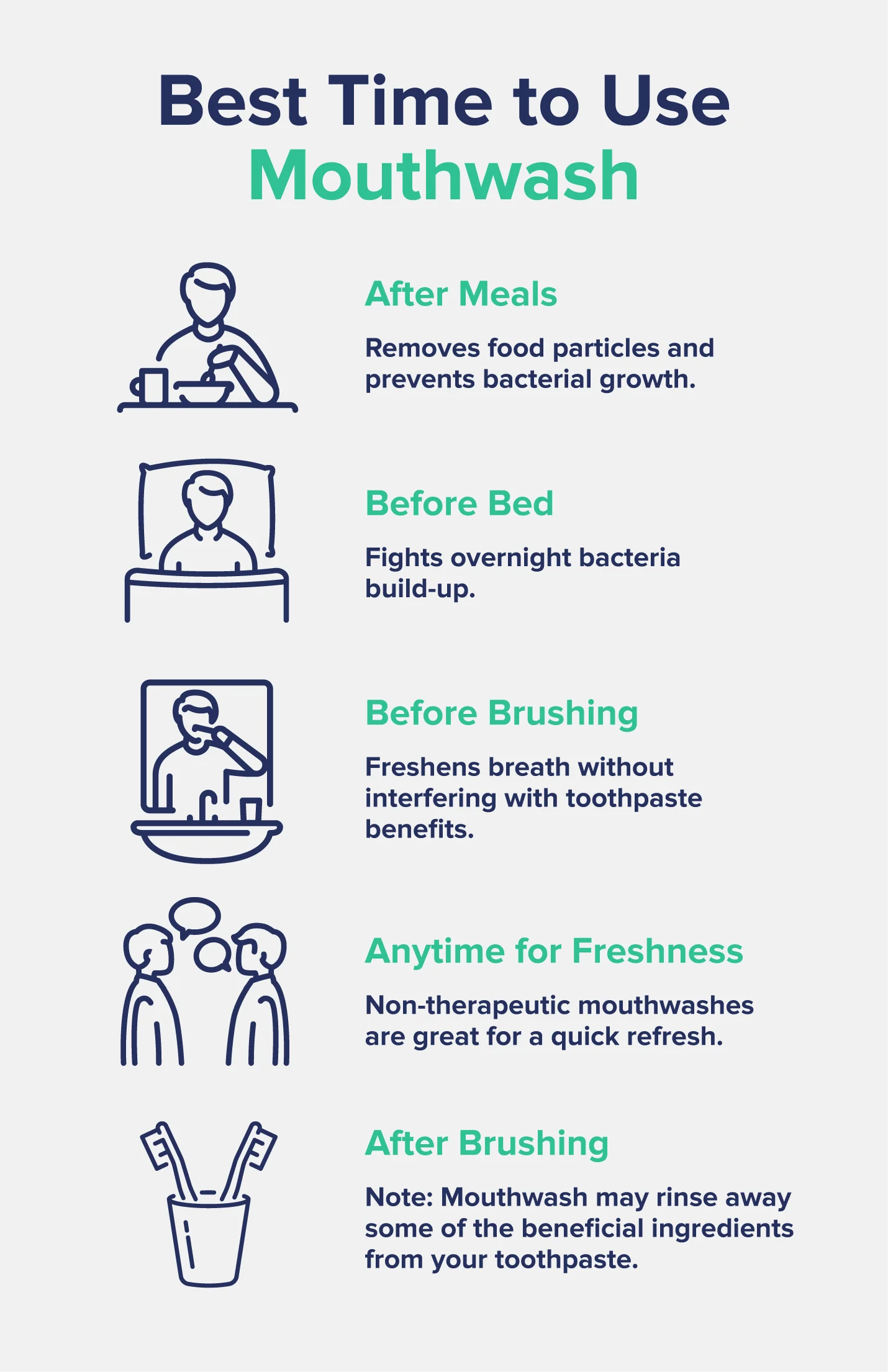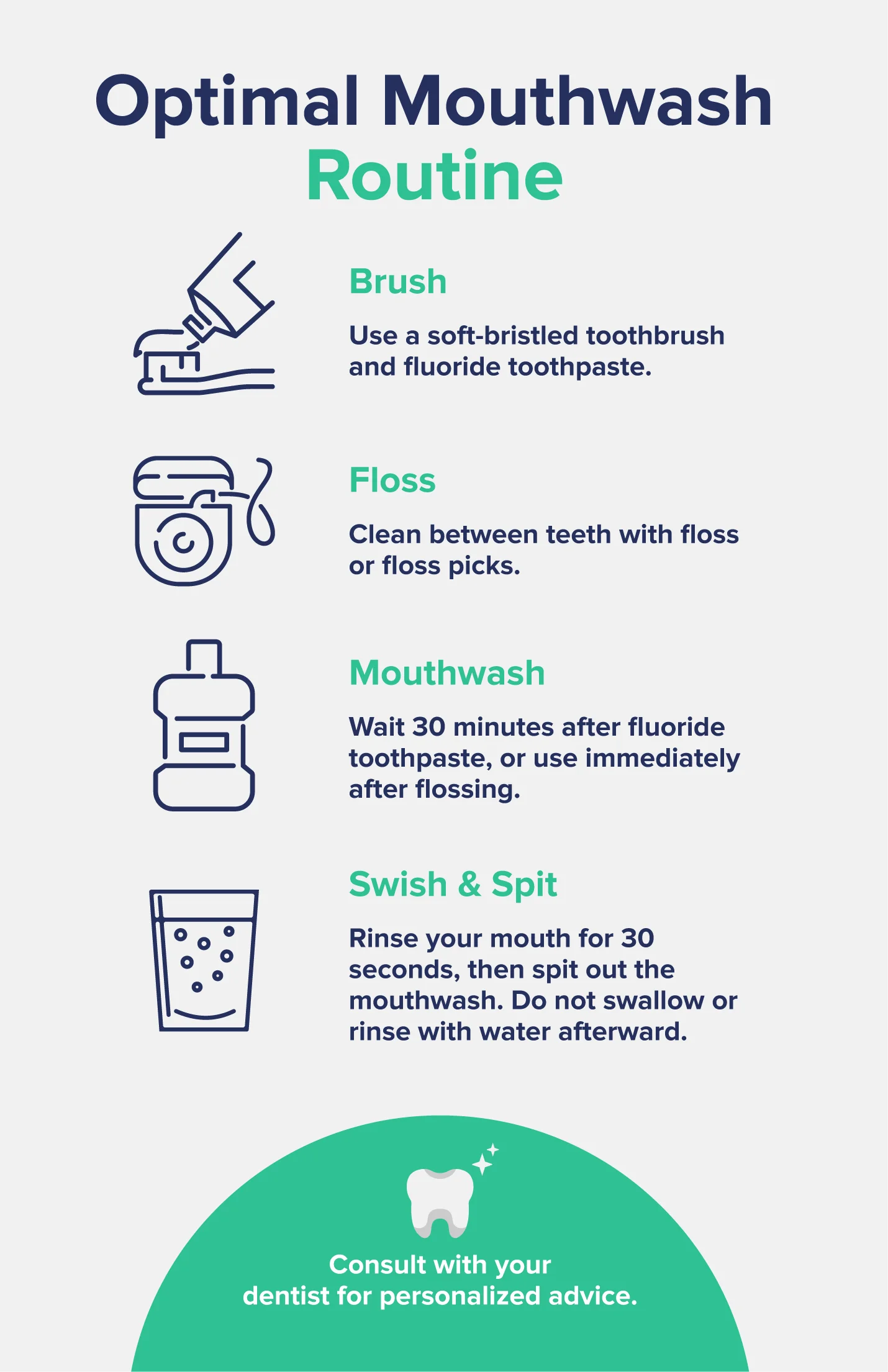Try our favorite, clean protein powder: See our top pick →
Try our favorite, clean protein powder: See our top pick →
This post contains links through which we may earn a small commission should you make a purchase from a brand. This in no way affects our ability to objectively critique the products and brands we review.
Evidence Based Research To fulfill our commitment to bringing our audience accurate and insightful content, our expert writers and medical reviewers rely on carefully curated research.
Read Our Editorial Policy
Mouthwash can be highly beneficial to oral health—although it certainly cannot replace brushing and flossing, adding mouthwash to your routine can uplevel your gum health, freshen your breath, and prevent plaque buildup and cavities.
But when is the best time to use mouthwash? Before or after brushing? After each meal? Before bed? Any time you leave the house? Not to worry, we’ve got you covered with the answers to these questions and more.
Many people want to know if you should use mouthwash before or after brushing—let’s see what some of the experts say.
Doctors at the Mayo Clinic state that mouthwash should be used after brushing and flossing your teeth.
However, the National Health Service (the healthcare system across the pond in the UK) recommends using mouthwash at an entirely different time of day than when you brush your teeth.
According to the NHS, mouthwash (or even rinsing with water) could wash off active ingredients from your toothpaste—this would be true if you use fluoride toothpaste.
They also say that you shouldn’t eat or drink for 30 minutes after using a fluoride mouthwash. If you don’t use fluoride toothpaste, you probably have more leeway with your timing.
Back in the U.S., the American Dental Association (ADA) is a bit more lax with its recommendations. According to these dental experts, it’s up to you! You can use mouthwash before or after brushing based on your personal preferences.
However, they also state that certain mouthwashes have a recommendation based on their specific ingredients or therapeutic uses, so take a look at your mouthwash bottle’s label first.
As you can see from these differing recommendations, there is no hard-and-fast rule about mouthwash timing. Overall, if you use fluoride toothpaste, you should wait 30 minutes or more before using mouthwash or rinsing your mouth in any way.
For fluoride-free folks, use your mouthwash at whichever time is most convenient, whether that’s before or after brushing. Many people enjoy the “fresh feeling” that comes from using a mouth rinse and like to use it as the final step in their oral hygiene routine, but that’s up to you.
(As a quick aside, if you’re curious about whether or not to use fluoride-based oral care products—which could be an entire article in itself—check out this review paper about the pros and cons of fluoridation to consider.)
The best time of day to use mouthwash can vary depending on your lifestyle, health status, and overall oral hygiene goals.
If you have oral health disorders, like gingivitis, cavities or tooth decay, periodontal (gum) disease, or halitosis (chronic bad breath), you may have different recommendations than someone using mouthwash for a quick mouth freshening.

Some of the most common times to use mouthwash include:
Again, how you use mouthwash most effectively depends on what you use it for, what ingredients it includes, and whether or not you use fluoride toothpaste.
In general, here is a typical oral care routine incorporating mouthwash:
However, as mentioned in the above sections, various health organizations have differing recommendations about mouthwash timing.

Following the ADA’s guidelines, you can use mouthwash before or after brushing based on your personal preferences. If you have specific questions about your oral hygiene routine or particular dental situation, see your dentist regularly and ask them to tailor a plan for you.
While mouthwash is not necessary, adding it to your oral care routine does have potential health benefits, including:
• Prevent or reduce tooth decay, dental caries (cavities), or plaque and tartar buildup
• Fight bad breath
• Kill off harmful bacteria (if it’s an antiseptic mouthwash)
• Prevent gingivitis or gum disease
• Reduce dry mouth (if not alcohol-based)
• Whiten teeth
According to the American Dental Association, mouthwashes can reach areas of your mouth that your toothbrush can’t, providing an extra layer of protection against cavities, tartar or plaque buildup, and gum issues.
As untreated gum disease can lead to gum recession and eventual tooth loss, therapeutic mouthwashes can be beneficial to prevent these issues.
Each dental professional organization has a different recommendation for this question. The Mayo Clinic recommends using mouthwash after brushing your teeth, while the NHS in the UK states that you should not use mouthwash immediately after brushing—it should be used at an entirely different time of day than when you brush your teeth or at least 30 minutes after brushing. This is because mouthwash or oral rinse can remove ingredients like fluoride. However, if you don’t use fluoride-containing toothpaste, this is unnecessary. The American Dental Association recommends using mouthwash at whichever time you prefer, including after you brush your teeth or after a meal.
Most mouthwashes recommend using them twice a day. But unlike brushing your teeth or flossing, there is no set “rule” about how often you should use mouthwash—unless your dentist specifically recommended a therapeutic mouthwash practice to combat an oral health issue.
Yes, you can use mouthwash before bed. If you use fluoride toothpaste, you should wait 30 minutes between brushing and mouthwashing. Otherwise, you can use mouthwash at any time, including before bed, for an extra antimicrobial boost.
Most mouthwash products recommend that you use them once or twice per day. Using mouthwash more than twice per day is typically not advised, especially if the mouthwash contains alcohol or other harsh ingredients. It’s also not recommended to use mouthwash if you have open sores or oral lesions in your mouth, as mouthwash can be highly irritating to those injuries. Plus, excessive mouthwash can cause a scary-sounding condition called “black hairy tongue,” which is usually temporary—decreasing the frequency or changing to less harsh mouthwashes can fix it.
Yes, you can use mouthwash after eating. This can be beneficial to rinse away food and unhealthy bacteria that have built up in your mouth. A post-meal oral rinse can also help to give you fresh breath in the midday period.
Subscribe now and never miss anything about the topics important to you and your health.